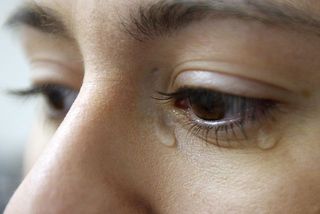Addiction
Getting Over an Abusive Ex
This too shall pass.
Posted November 19, 2016 Reviewed by Kaja Perina

Nina just got dumped by someone who emotionally abused her for nine years. She told us: "You're probably thinking, ‘Great! You just dodged a bullet.’ " That's what all her friends are telling her. The problem is: she wants him back.
This is a very common scenario: You are completely hooked on a person who no longer wants you and who was mean and abusive to you while you were still in a relationship. You are literally addicted. The only cure is to overcome the addiction. But how do you do that?
The first step to overcoming an addiction is admitting you have one. You need to realize that you are on the hook, and that you don’t want to be on the hook anymore.
If you got dumbed by an abusive person, that person did you a favor, even though your emotions may tell you otherwise. If your emotions deceive you, this is completely understandable for many reasons. For one thing, being socially rejected—even by someone whose opinion of you does not matter—hurts. Your brain registers it the same as if you had been physically hurt.
In addition to this physiological response, you’re probably feeling withdrawal from oxytocin, norepinephrine, serotonin and dopamine. These brain chemicals generate feelings of pleasure and reward associated with being bonded to another person. When a bond is broken unexpectedly, you experience a stress response, in which your sympathetic nervous system puts you in "fight or flight" mode.
The dumping may have been the end to a long roller coaster ride of ups and downs with your ex. Erratic relationships, swinging between bad and good times, can have similar effects as a new love addiction. When things are going well, norepinephrine, serotonin and dopamine generate feelings of pleasure and reward, and they can do that too if you are in a bad relationship and the victim of abuse.
When your relationship ends, the pleasure and reward chemicals plummet, leaving you miserable and hopeless; you are an addict without her drug. Your brain is waiting for another "up" that will not arrive.
Another reason you may be feeling intense grief after the end of a relationship—even an abusive one—is not only will you need to grapple with the loss of a partner (even if a shitty one), you also need to figure out what your new identity will be without this person in your life. You need to get over, not only the loss of a relationship, but also the loss of your previous life and your previous self.
Like Nina, you may be able to take solace in the fact that you have friends who want what is best for you and who will be with you as you craft your new self sans abuser. Foster these friendships, as the strength of social support is the number one predictor of how well a person can recover from a psychological setback. Without a controlling boyfriend, you have the freedom to be with your friends and to become the person you want to be.
You may be thinking, "but the person I want to be is my ex's girlfriend!" But is that really so? The pain you are feeling may make you lie to and deceive yourself. You may be wishing you could “fix” the relationship since you have already invested so much time in it. You may be hoping to justify what seems like wasted years by continuing the relationship.
But don't forget what it would be like to be with an abusive person for another year or two or three of your life. If you got back together with your abuser, you would lose more time and be prevented from finding a healthier and more rewarding relationship. You would be unable to do other things that can enhance your life in the long run, such as pursuing additional education or picking up salsa dancing. You would invest more energy in something that is ultimately not good for you. Your ex has already taught you a lesson or two. It is time to move on.
This is easier said then done. Unfortunately, if you are still hooked on your ex, there is no immediate cure that can remove your pain. Breakup pain is a kind of pain you need to live through. But know that grieving the loss of someone you have been close to and intimate with is a universal experience. You can become even more resilient by living through the grief and pain. Be kind to yourself right now. Don’t judge yourself. Even if it doesn't seem like it right now, this too shall pass.


